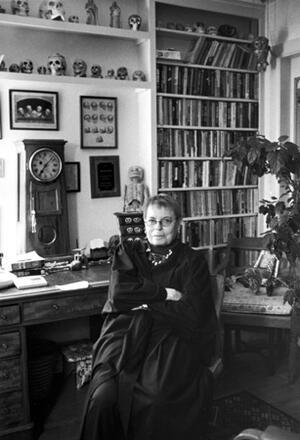Elsbeth Bothe
Known as a criminal lawyer and a judge with a unique presence on the bench, Elsbeth Bothe was born in 1927 to a large Baltimore German-Jewish family, the Levys. A great-granddaughter of Isaac Hamburger, founder of Hamburger and Sons Clothiers, Elsbeth was educated at The Park School before attending the University of Chicago and the University of Maryland School of Law. Elsbeth met her husband, Bert Bothe, in 1952 while both were activist lawyers in the labor movement. She worked in Mississippi during the civil rights movement and was active with the United Auto Workers and the Legal Aid Bureau upon her return to Baltimore. Elsbeth specialized in labor and criminal law while an associate in private practice and later in the Public Defender's Office. In 1978, she became the third woman appointed as a judge to the Baltimore Circuit Court. Elsbeth Bothe passed away on February 27, 2013.
Bothe discusses her family background, childhood memories, and early influences, including her extended Hamburger family and their retail men’s clothing business, and her attendance at the progressive Park School, from which she graduated in 1945. She describes how areas of Pikesville and Baltimore corresponded with religious affiliation and socioeconomic status and identified conflict between German and Russian Jews as more prominent than between Jews and non-Jews. Elsbeth attended the University of Chicago and talks about the culture and political atmosphere of the school. She then attended ETH Zurich [Swiss Federal Institute of Technology] in Zurich, Switzerland. Elsbeth explains how her career unfolded. She worked at the International Brotherhood of Electrical Workers, an AFL-Craft Union, although she did not enjoy it. She next worked at Locke Insulator Corporation in the Employee Relations Department. Then, Elsbeth started law school at the University of Maryland and became involved with Americans for a Democratic Action and the United Automobile Workers. She met her husband, a United Automobile Workers employee, who eventually became Regional Director, at a strike. In discussing her marriage with her non-Jewish husband, Bothe reveals her thoughts on intermarriage and the social stigma at the time for an unmarried woman living with a man; she started living with Bert around 1952, and they got married around 1965. After graduating from law school, Bothe worked for the Legal Aid Bureau of Baltimore. When she was fired, Elsbeth went into practice with Bernard Link and Edward Mogowski, and it was when working with them, she got her big break in criminal law, the area in which she wanted to work. She also worked with ACLU [the American Civil Liberties Union], which led to her employment by Allan Merrill in the Public Defender's Office of Maryland. Bothe reflects on her activism and involvement in the Civil Rights movement. Besides participating in sit-ins and other activities, she was a lawyer for the LCDC [Lawyers Constitutional Defense Committee], a subset of the ACLU. In that capacity, she spent a couple of memorable summers in Mississippi, representing Civil Rights "violators." She was appointed to the bench in 1978 and presided over several important trials. The interview ends with Bothe discussing her love of skeletons and true crime books and her retirement life. The interview explores Bothe's conception of her own Jewish identity. Although Bothe disregards sexism as a barrier to her legal career, the interview also reveals the history of discrimination against women in the legal profession.



